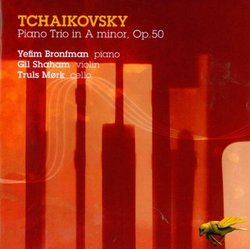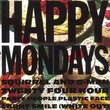| All Artists: Bronfman, Shaham, Mork Title: Tchaikovsky: Piano Trio in A minor, Op. 50 Members Wishing: 0 Total Copies: 0 Label: Canary Classics Original Release Date: 1/1/2008 Re-Release Date: 8/26/2008 Genre: Classical Styles: Chamber Music, Historical Periods, Classical (c.1770-1830) Number of Discs: 1 SwapaCD Credits: 1 UPC: 892118001051 |
Search - Bronfman, Shaham, Mork :: Tchaikovsky: Piano Trio in A minor, Op. 50
CD DetailsSimilar CDs |
CD ReviewsA Fairly Good Performance, But Why Only 47 Minutes on This C J Scott Morrison | Middlebury VT, USA | 10/01/2008 (3 out of 5 stars) "Tchaikovsky initially turned down a request from his patroness, Madame Nadezhda von Meck, to write a piano trio, saying that he didn't like that combination of instruments. But he must have changed his mind, because a year or so later he relented and wrote the A Minor Trio, Op. 50. The work has been criticized because it has some formal problems and because the piano part dominates the proceedings. But this hasn't kept music-lovers from taking the work to their hearts and it has received many fine recordings. Among my favorites are a previous one featuring this disc's pianist, Yefim Bronfman, partnered by Cho-Liang Lin and cellist Gary Hoffman Tchaikovsky: Piano Trio in Am Op50; Arensky: Trio No1. And there is a marvelous recording by Jacqueline du Pré, Pinchas Zukerman and Daniel Barenboim Beethoven: Violin Sonatas Nos. 7-10; Tchaikovsky: Piano Trio. But probably the best of the lot is that by Martha Argerich, Gidon Kremer and Mischa Maisky Shostakovich/Tchaikovsky: Piano Trios; now that one is a barn-burner! Furthermore, each of the above recordings has additional music on the disc. The earlier Bronfman includes the well-loved Arensky Trio. The Barenboim, a 2-CD set at budget price, includes Zukerman and Barenboim playing four late Beethoven violin sonatas. The Argerich contains an incendiary Shostakovich Trio No. 2, Op. 67.
So how does this one with Bronfman, Gil Shaham and the magnificent Norwegian cellist, Truls Mørk, stack up? It strikes me a musically fine, technically more than fine, and emotionally a little cool. I'm not sure 'cool' is what Tchaikovsky requires, but there are those I imagine who don't like the hyper-emotionality of Tchaikovsky. The first movement, which is after all marked 'elegiaco', is indeed that, but it is a rather muted sadness rather than the heart-on-sleeve melancholy one might prefer. (It should be noted that the Trio was written as a memorial to Tchaikovsky's recently deceased friend and colleague, Nicolai Rubinstein.) The second (and last) movement is a theme-and-variations that allows for disparate moods. The sparkling third variation here does not come off as glittering as in some other recordings, but the sixth, a grand waltz, has just the right lilt. Bronfman, Shaham and Mørk make the most of the rather lame fugue of Variation 8. The mazurka of Variation 10 is exquisite. And the finale has the right combination of brio, melancholy and songfulness. On the whole, then, I would not rate this performance at the very top of my list of favorites, but I do enjoy Bronfman's assurance and Mørk's lyricism cum boldness. It is with Shaham that I find the most fault. Frankly his playing strikes me as a little timid, a little diffident. Granted this is not a virtuoso piece for the violin, and the piano is undoubtedly the leader in the trio, but still his performances is a little too modest for my taste. That, coupled with the CD's short timing, leads me to give it only a moderate rating. Scott Morrison " |


